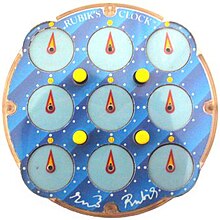Rubik's Clock

The Rubik's Clock is a mechanical puzzle invented and patented by Christopher C. Wiggs and Christopher J. Taylor.[1] The Hungarian sculptor and professor of architecture Ernő Rubik bought the patent from them to market the product under his name. It was first marketed in 1988.
The Rubik's Clock is a two-sided puzzle, each side presenting nine clocks to the puzzler. There are four dials, one at each corner of the puzzle, each allowing the corresponding corner clock to be rotated directly. (The corner clocks, unlike the other clocks, rotate on both sides of the puzzle simultaneously and can never be operated independently. Thus, the puzzle contains only 14 independent clocks.)
There are also four pins which span both sides of the puzzle; each pin arranged such that if it is "in" on one side, it is "out" on the other. The state of each pin (in or out) determines whether the adjacent corner clock is mechanically connected to the three other adjacent clocks on the front side or on the back side: thus the configuration of the pins determines which sets of clocks can be turned simultaneously by rotating a suitable dial.
The aim of the puzzle is to set all nine clocks to 12 o'clock (straight up) on both sides of the puzzle simultaneously. A method to do so is to start by constructing a cross on both sides (at 12 o’clock) and then solving the corner clocks individually.
The Rubik's clock is listed as one of the 17 WCA events, with records for fastest time to solve one puzzle, and the fastest average time to solve 5 puzzles (discarding the slowest and fastest times). The puzzle is unique in the WCA in that it is the only puzzle for which viable speedsolving methods have been devised that always solve it in God's number moves (14 for the clock) or less; an example is "7-Simul", which involves performing seven pairs of moves on the front and back of the clock simultaneously and requires mental calculation from the puzzle's initial position to determine some moves.
Combinations
[edit]Since there are 14 independent clocks, with 12 settings each, there are a total of =1,283,918,464,548,864 possible combinations for the clock faces. This does not count for the number of pin positions.
Notation
[edit]The puzzle is oriented with 12 o'clock on top, and either side in front. The following moves can be made:[2]
Pin movements
[edit]- UR (top-right): Move the top-right pin up.
- DR (bottom-right): Move the bottom-right pin up.
- DL (bottom-left): Move the bottom-left pin up.
- UL (top-left): Move the top-left pin up.
- U (both top): Move both top pins up.
- R (both right): Move both right pins up.
- D (both bottom): Move both bottom pins up.
- L (both left): Move both left pins up.
- ALL (all): Move all pins up.
Wheel movements
[edit]- X+ (X clockwise turns): Turn a dial next to an up-position pin clockwise X times, then move all pins down.
- X− (X counter-clockwise turns): Turn a dial next to an up-position pin counter-clockwise X times, then move all pins down.
Puzzle rotation
[edit]- y2: Flip the puzzle, then move all pins down.
Records
[edit]The world record for single solve is held by Brendyn Dunagan of the United States with a time of 1.97 seconds, set at La La Land 2024. The world record for Olympic average of five solves is held by Volodymyr Kapustianskyi of Ukraine with an average of 2.39 seconds, set at Grand Forks 2024.
Top 13 solvers by Olympic average of 5 solves[4]
[edit]References
[edit]- ^ Patents EP0322085 (1989-06-28), JP1171588 (1989-07-06), GB2213739 (1989-08-23), US4869506 (1989-09-26)
- ^ "WCA Regulations | World Cube Association". www.worldcubeassociation.org. February 1, 2023. Retrieved 2023-04-24.
- ^ World Cube Association Official Clock Rankings - Single
- ^ World Cube Association Official Clock Rankings - Average
External links
[edit]- Unofficial Records Speedsolving.com's page of unofficial records for many puzzles including Rubik's Clock
- Real Genius Computer game implementation of Rubik's Clock for the Commodore Amiga, released in 1989
- https://www.worldcubeassociation.org/results/rankings/clock/average
- https://www.worldcubeassociation.org/results/rankings/clock/single?show=100+persons

